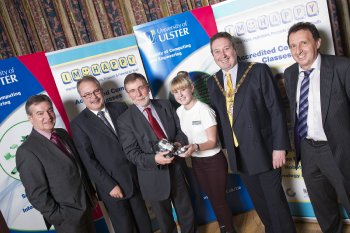
Over 150 young people from the Coleraine area will have the opportunity to develop their computing and IT skills through a new University of Ulster initiative.
The IM HAPPY (IMproving Hopes, Aspirations, Potential and Prospects in the Youth) project – funded by a grant of £360,738 from the Department for Social Development’s Neighbourhood Renewal scheme – seeks to promote achievement as a means of improving the self-esteem, self-belief and self-confidence of a diverse range of learners.
The programme will run until March 2015 and will be targeted principally at schools and community groups in two Coleraine regions – Coleraine Churchland (Killowen and Heights) and Coleraine East (Ballysally and Millburn) – which are among the most deprived areas in Northern Ireland.
Commenting during a visit to the University yesterday where he met with those taking part in the project, Social Development Minister, Nelson McCausland said: “This project not only hopes to make residents more proficient and skilled in computing creating the potential for employment, but to also raise aspirations to consider further education as an alternative to unemployment. Some of the technology I have seen here today is very innovative and creative and I have no doubt will be of great benefit to those taking part.
“Having the University of Ulster involved in delivering such a project directly into neighbourhood renewal areas is an excellent partnership and I hope we can build on this in the future for the benefit of other local communities.”
Martin McKinney, Head of the School of Computing and Information Engineering, added: “We are excited about this project’s potential to make a significant contribution to ‘town and gown’ in the region.
“University-funded widening access initiatives have already demonstrated that students’ aspirations and confidence levels could be raised, through participation in computer-based activities. IM HAPPY extends these principles to the wider community and will enable participants to take classes in areas as diverse as web and app development, robotics and social media.
“Ultimately, the project has the potential to equip the most disadvantaged in our local area with the expertise to meet future labour market needs. The project will provide a significant skills boost to the north-west, making it an increasingly attractive proposition for prospective STEM based industries.”
All activities will be delivered by a team from the School of Computing and Information Engineering, who will support and mentor learners to develop their professional and vocational skills using the most up-to-date tools and technologies. As each participant progresses, it is anticipated that they will become increasingly confident in their own abilities and this will provide the impetus for them to realise their full potential.
Students’ achievements will be formally recognised through a University module accreditation and at an awards ceremony in spring 2015.
Martin added: “While the primary focus is on youth, the IM HAPPY project will not be age-restricted. Adults wishing to avail of the opportunities will be made welcome and it is hoped that family members of participants will be encouraged by the work of the initial participants.
“We are confident that some individuals will show particular skills and abilities and they will be encouraged to take additional training as coaches who can pass their learning on. It is a genuine aspiration that this project will help produce a better educated local workforce which in turn may prove to be a catalyst for attracting investment in high tech jobs to the area.”

Elsewhere on Ulster
- Study – Undergraduate, Postgraduate, Part-time, Research and Short Courses
- Global Students – Resources for Ulster University International Students
- Staff Links – Resources for Ulster University staff
- Students - The Student Guide to Ulster
- Staff – search and browse Ulster’s staff directory
- Portal - for Ulster University
- News – for Ulster University
- Events – for Ulster University
-
Ulster Homepage
















